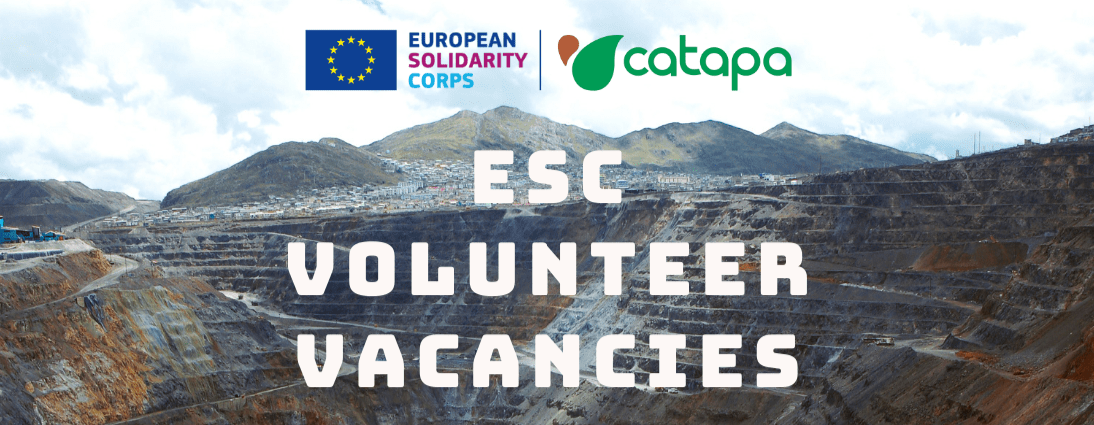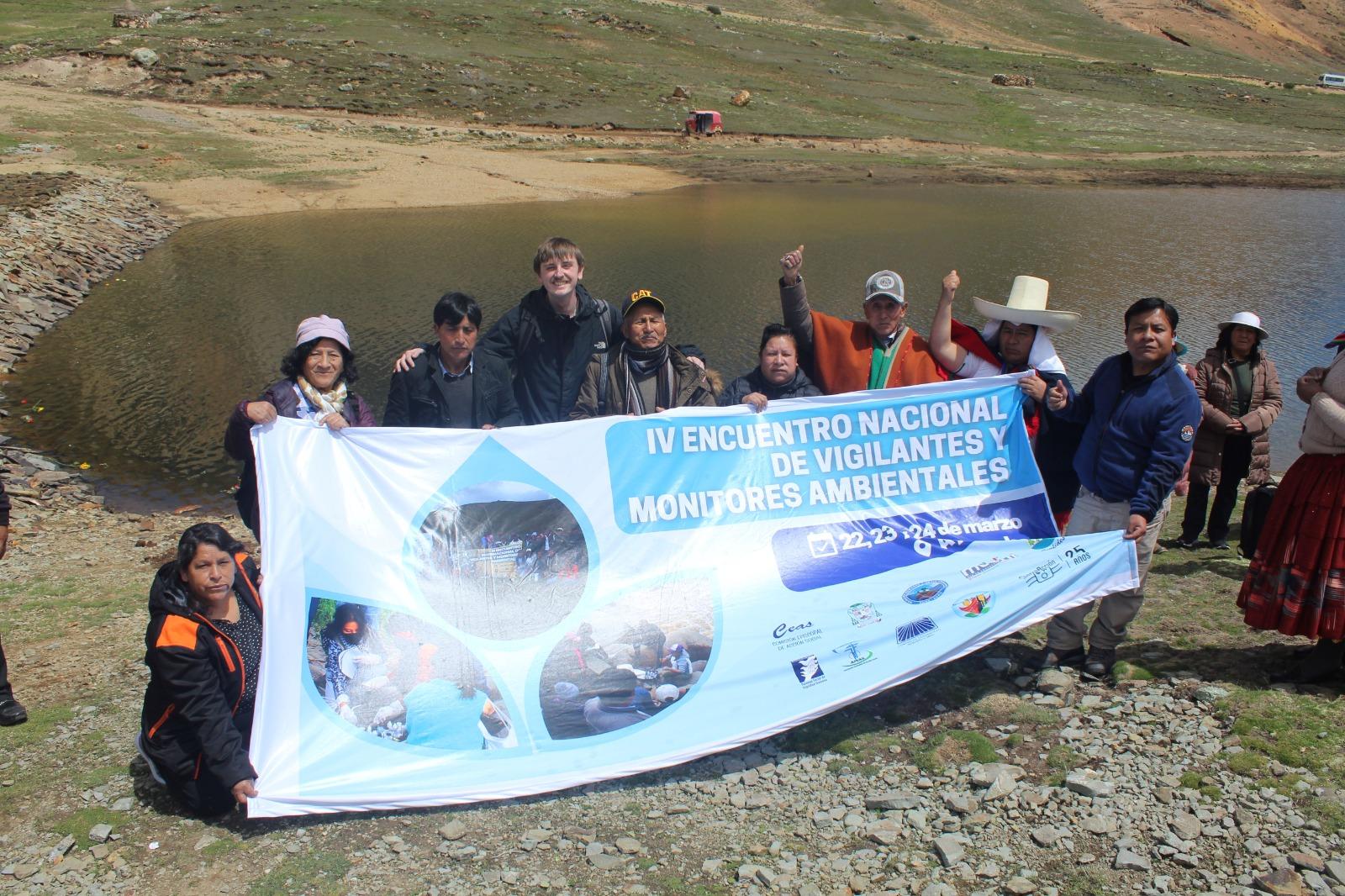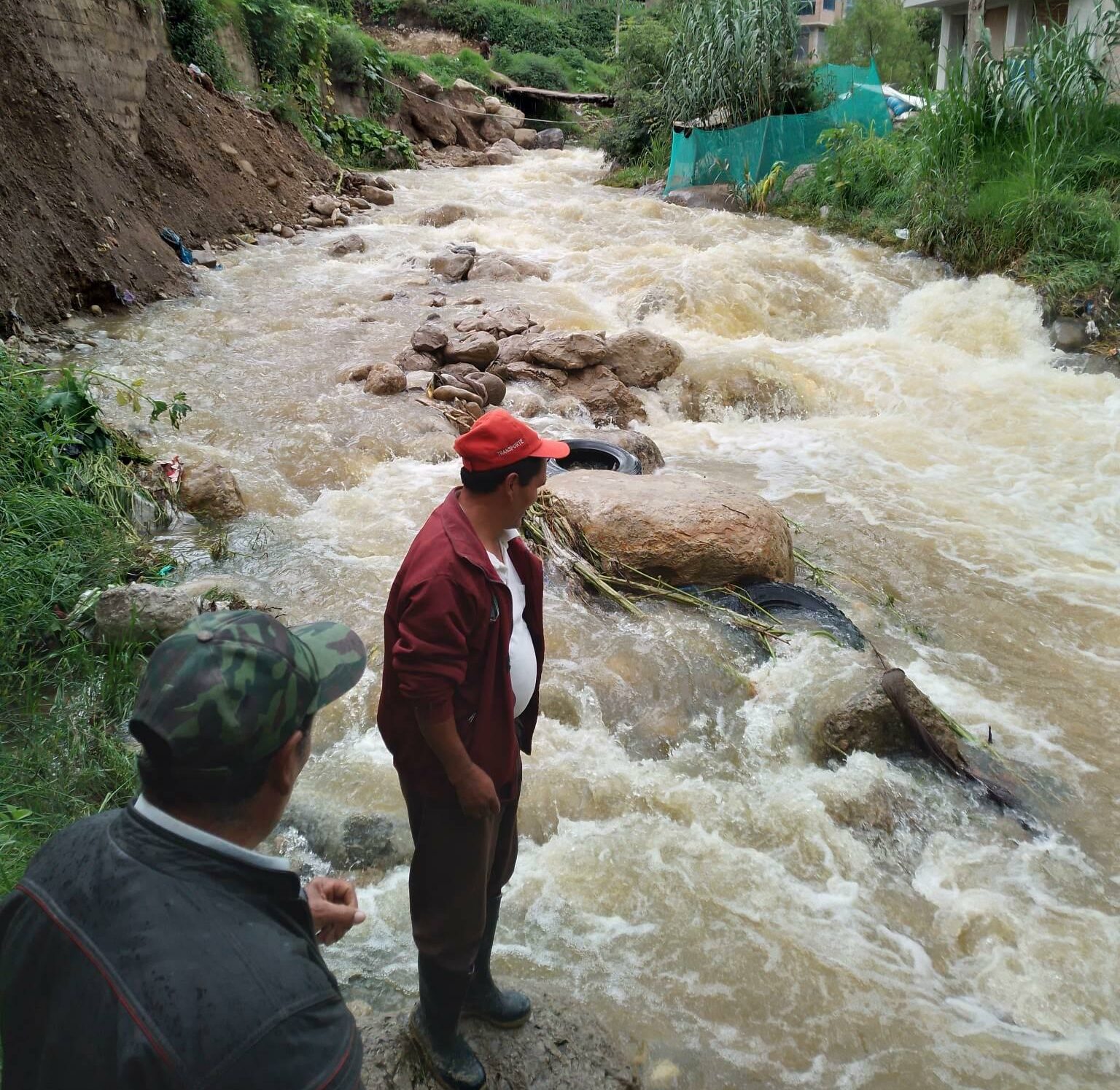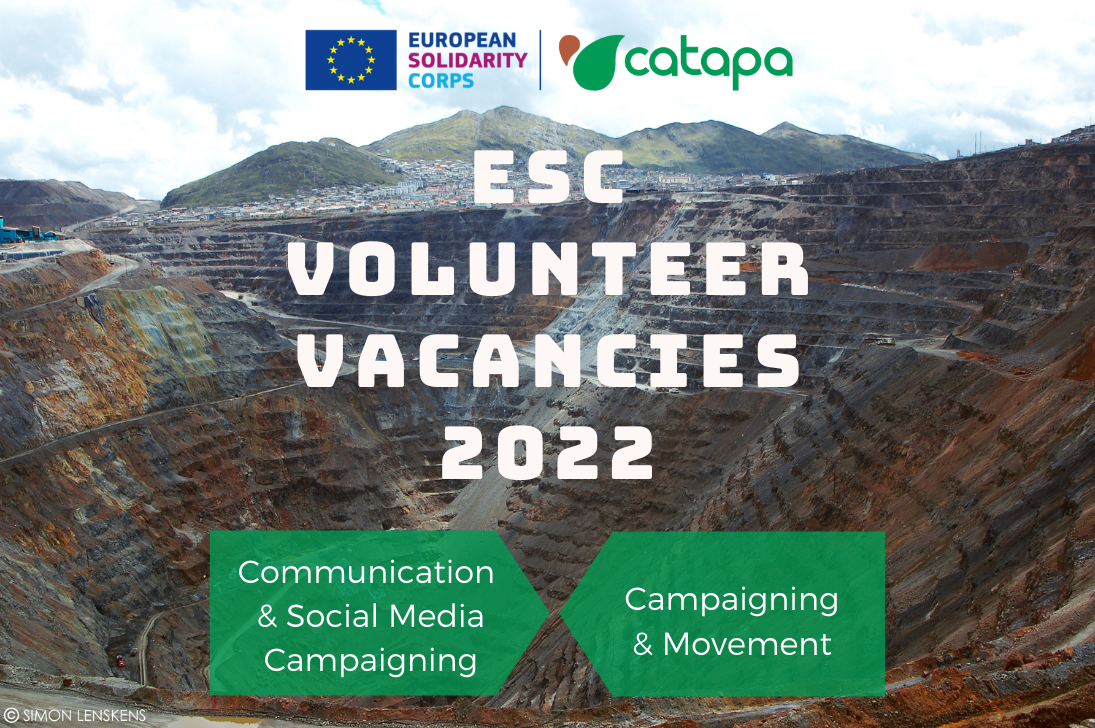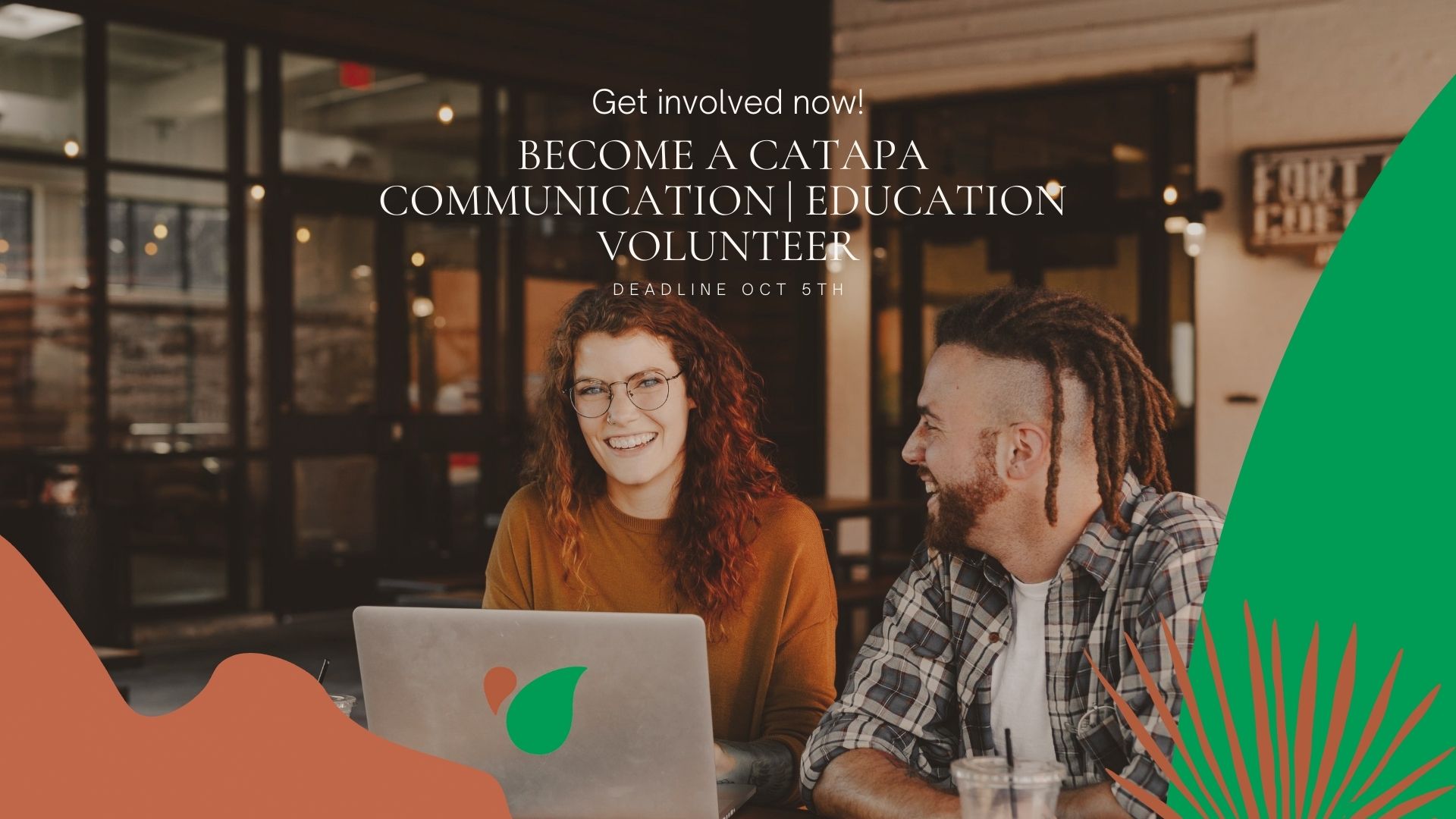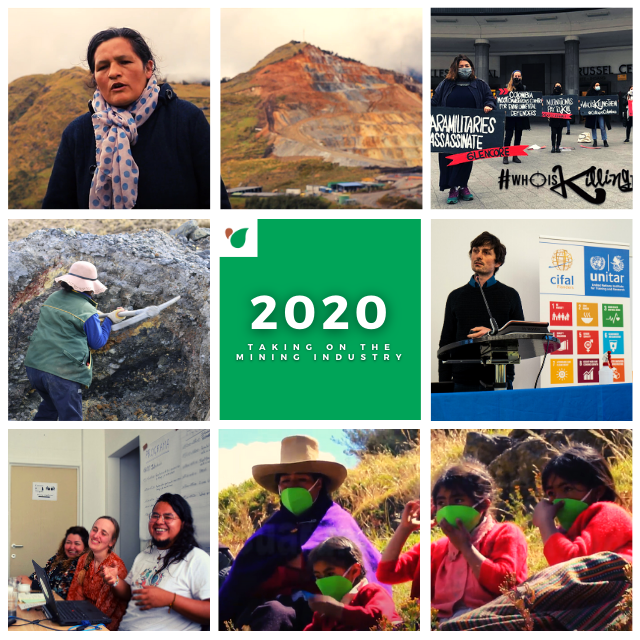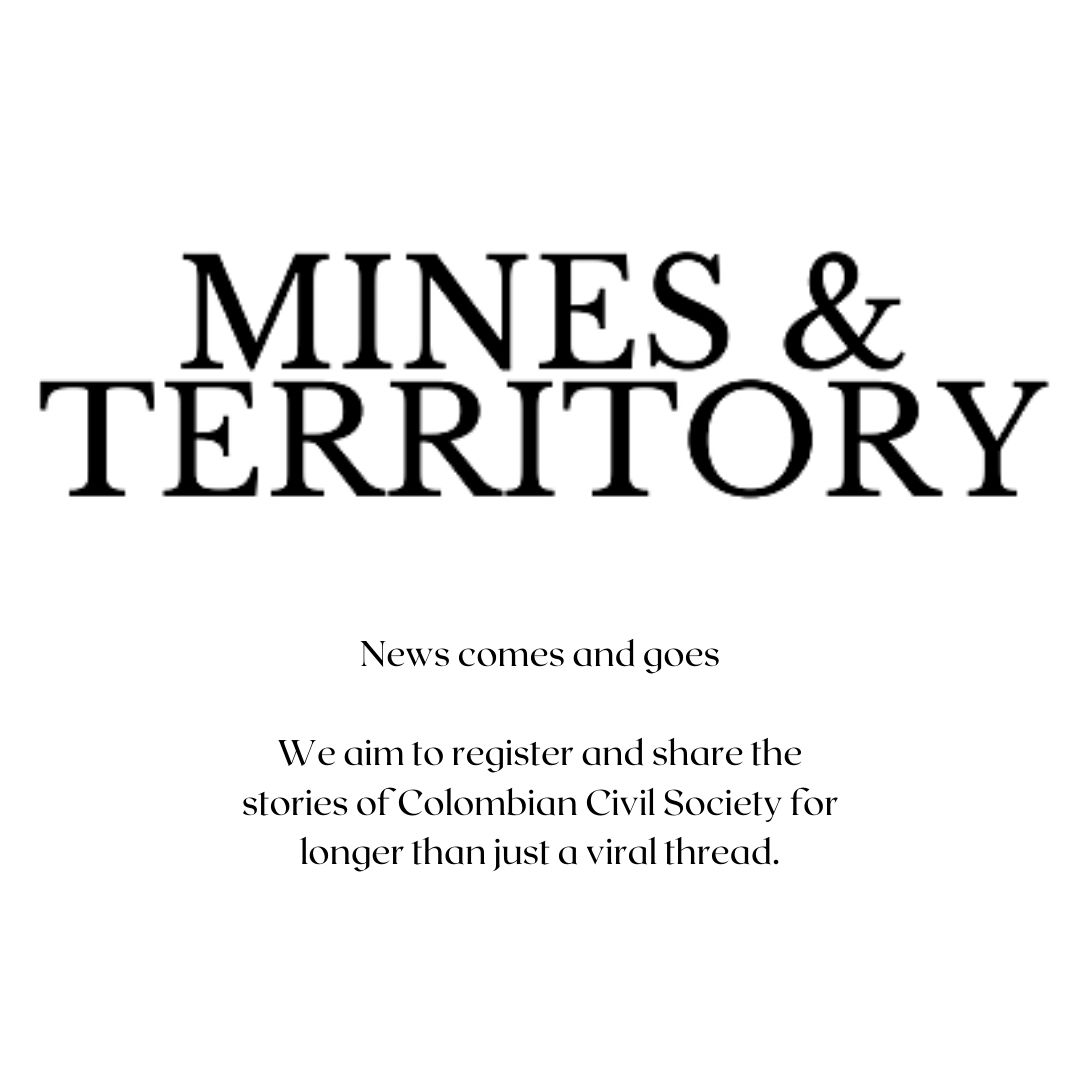Call closed – ESC Volunteer Vacancies 2024
The deadline for this call has passed the 4th of June 2024 at 23h59. If you are selected for the interviews you will be contacted in the beginning of August. Please try to minimize questions, as there are a lot of interested volunteers. If you still have an urgent remark or question you can contact the relevant Catapista for the volunteering position you applied to:
- Campaign and Movement: karlijn.vandenbroeck@catapa.be
- Partners and Networks: karlijn.vandenbroeck@catapa.be
- Communication & Social Media Campaigning: communication@catapa.be
If you want to learn more about CATAPA, feel free to browse our website.
Campaigning & Movement (pdf download)
Partners & Networks (pdf download)
Communication & Social Media Campaigning (pdf download)
About CATAPA
CATAPA is a movement which strives for a world in which the extraction of non-renewable resources is no longer necessary. The extraction of such materials always entails major social and environmental impacts and fuels conflict. In working towards global social and environmental justice, we focus on mining issues (ecological disasters, human rights violations, etc.). In Ecuador, Bolivia, Peru and Colombia we work together with grassroots movements and support local communities who are threatened by large-scale mining projects. In Belgium, we activate citizens to denounce the current overconsumption and overproduction of electronics.
Our main activities are:
- Campaigning on the impact of mining and sustainable production of electronics in Flanders.
- Supporting partners and local communities in Latin America that are threatened by large-scale mining projects.
- Creating a movement around sustainable production and consumption of metals.
- Networking, research & stimulating alternatives.
CATAPA is dependent on the work of volunteers – the Catapistas.
Our campaigns
- The Right to Say No – Mining activities cause devastating environmental impacts and human rights violations across the globe. CATAPA is campaigning on the Right to Say No. Communities opposing extractive projects face severe repression and human rights violations. A just transition requires local communities having the decisive say over extractive projects within their territories.
- CTRL ALT DEL – Stop#ExpresDefect – Our current linear model of consumption and production is a driving cause of the climate crisis. In this “throwaway” model, electronic products are designed to make repair difficult or unfeasible with limited life spans. This is planned obsolescence. The infinite supply of electronics is at odds with planetary boundaries. We cannot continue extracting more and more metals and minerals. Through our (mainly Dutch) Ctrl Alt Delete: Stop#ExpresDefect campaign we are activating Flemish civilians to advocate for strict regulations to ensure electronic products are eco-designed, repairable, and made to last.
- Bankswithoutmining – Bankswithoutmining is a newly formed working group aiming to push banks in the Global North to divest from mining activities. This initiative addresses the critical need to tackle the environmental and social impacts of bank investments in mining companies. Our campaign seeks to elevate mining issues in public debates, persuade investors to withdraw support from harmful mining practices, and form equal partnerships with organisations in the Andes and Europe to strengthen our efforts and create impactful change.
Our main campaigning activities are:
- Our main campaigning activities are:
- Raising awareness of the broader public: (social media) campaigns, educational activities, public actions, …;
- Searching and supporting solutions & alternatives;
- Collaboration & networking with other organisations that focus on mining issues, Degrowth and Circular Economy;
- Advocating for an end to planned obsolescence via our Ctrl Alt Delete – Stop#Expresdefect campaign;
- Collaboration with grassroots organisations in Latin America, defending the rights of affected communities via our campaign on the Right to Say No to mining;
- Push banks in the Global North to divest from mining activities.
Possible tasks and requirements
Click on the volunteer opportunity of your preference below to learn more about the possible tasks and requirements.
Who are we looking for?
We are looking for an ESC (European Solidarity Corps) volunteer to support the CATAPA movement, and in particular the campaign Ctrl Alt Delete – Stop#ExpresDefect. The volunteer will be trained to think critically and spread knowledge of these issues and to encourage other people to become active citizens. The tasks are flexible depending on your learning goals and the needs of the organisation.
You will be part of our office team (4 part-time staff + 3 ESC volunteers + variable number of interns) which supports the work of the movement. Since CATAPA is a volunteer movement, you will be working in close collaboration with volunteers with a diverse and broad experience.
Possible tasks
- Help with the development and implementation of the campaign strategy, communication and tools for the Ctrl Alt Del – Stop#ExpresDefect campaign
- Co-coordinate the Ctrl Alt Del – Stop#ExpresDefect campaign
- Help organise movement activities such as the movement weekends (twice a year) or movement days
- Help follow-up the engagement of volunteers in CATAPA.
- Help with setting up awareness raising and training activities for a variety of target groups (training or movement days/weekends, documentary screenings, workshops, info evenings, public actions, …).
- Support the Right To Say No activities
- Support the divestment campaign
- Some administrative tasks related to the daily functioning of our office with the possibility to get an insight in the management of a non-profit organisation.
- Write, revise and proofread articles, blogs, educational tools and reports.
- Possibility to develop and implement your own projects.
Requirements
Essential:
- Motivated to work with volunteers
- Motivated to motivate others
- Interest in learning about the social and environmental movement, planned obsolescence, e-waste and mining issues
- Good command of English
- Independent, proactive worker
- Good communication skills
- Willing to contribute to positive change in the world we live in
- Team player with a flexible attitude
- Willingness to travel through Flanders and to Brussels
- Age below 31 years, no residence in Belgium (this is a requirement of the ESC programme)
- Agreeing with a flexible work schedule where you sometimes will work in the evening or in weekends since events and meetings often take place in the free time of the attendees and our volunteers
- Ability to learn on the job and DIY spirit
Nice to have:
- Knowledge/experience on or interest to learn about:
- Implementation and coordination of campaignsDevelopment of campaign strategy
- Organising educational or training events and tools
- Project writing and management
- Volunteer engagement
- Advocacy and networking
- Activist and movement organising
- Circular and degrowth economy, environmental movements and/or social movements
- Knowledge of Dutch and/or Spanish
Interested or more information?
Please send your CV and motivation letter to karlijn.vandenbroeck@catapa.be at the latest the 4th of June 2024 at 23h59. If you have any questions concerning this vacancy, don’t hesitate to contact us.
More information: www.catapa.be
Who are we looking for?
We are looking for an ESC (European Solidarity Corps) volunteer to support the CATAPA movement, and in particular the Right To Say No campaign. The volunteer will be trained to think critically and spread knowledge of these issues and to encourage other people to become active citizens. The tasks are flexible depending on your learning goals and the needs of the organisation.
You will be part of our office team (4 part-time staff + 3 ESC volunteers + variable number of interns) which supports the work of the movement. Since CATAPA is a volunteer movement, you will be working in close collaboration with volunteers with a diverse and broad experience.
Possible tasks
- Participate in the follow-up of our partners in the Andes region through online meetings
- Engaging in networks on social and ecological justice and defending our partners demands in these networks
- Help looking for funds and campaign opportunities for our partners
- Proofreading and contributing to fund applications and reporting of our partners
- Actively participating and supporting the CATAPA working groups “right to say no” and “divestment”
- Helping with the development and actions of the Right To Say No campaign
- Assist in planning activities on the Right To Say No campaign, which gives the voice to environmental defenders from affected communities to share their stories and build international solidarity
- Write, revise and proofread articles, blogs, educational tools and reports.
- Support communication from and with partners in Latin America
- Some administrative tasks related to the daily functioning of our office with the
- Possibility to get an insight in the management of a non-profit organisation
- Help organise movement activities such as the movement weekends (twice a year) or movement days
- Support the divestment campaign
- Help follow-up the engagement of volunteers in CATAPA
- Possibility to develop and implement your own projects.
Requirements
Essential:
- Motivated to work with volunteers
- Motivated to motivate others
- Interest in learning about the social and environmental movement, planned obsolescence, e-waste and mining issues
- Good command of English
- Independent, proactive worker
- Good communication skills
- Willing to contribute to positive change in the world we live in
- Team player with a flexible attitude
- Willingness to travel through Flanders and to Brussels
- Age below 31 years, no residence in Belgium (this is a requirement of the ESC programme)
- Agreeing with a flexible work schedule where you sometimes will work in the evening or in weekends since events and meetings often take place in the free time of the attendees and our volunteers
Nice to have:
- Knowledge about/experience in or interest to learn about:
- International Cooperation and Human Rights
- Fundraising
- Project writing and management
- Organising educational or training events
- Advocacy and networking
- Volunteer engagement
- Circular and degrowth economy, environmental movements and/or social movements
- Latin-American politics
- Knowledge of Dutch and/or Spanish
- Volunteering experience
Interested or more information?
Please send your CV and motivation letter to karlijn.vandenbroeck@catapa.be at the latest the 4th of June 2024 at 23h59. If you have any questions concerning this vacancy, don’t hesitate to contact us.
More information: www.catapa.be
Who are we looking for?
We are looking for an ESC (European Solidarity Corps) volunteer to support the CATAPA movement, and in particular the communication within the campaigns on the Right to Say No and Planned Obsolescence. You will be working alongside our communications officer. The volunteer will be trained to think critically and spread knowledge of these issues and to encourage other young people to become active EU citizens. The tasks are flexible +depending on your learning goals and the needs of the organisation.
You will be part of our office team (4 part-time staff + 3 ESC volunteers + variable number of interns) which supports the work of the movement. Since CATAPA is a volunteer movement, you will be working in close collaboration with volunteers with a diverse and broad experience.
Possible tasks
- Contribute in managing our social media channels and create content for those channels (Facebook, Instagram, X, LinkedIn). We mainly communicate in Dutch, but also regularly in English and Spanish.
- Help with the communication and promotion for events.
- Assist with the social media aspects of our central campaigns.
- Help in keeping our website updated.
- Write, review and proofread articles.
- Create low-threshold graphic design (for example for a poster, a flyer or for a social media post).
- Support communication from and with partners in Latin America
- Support the Right To Say No activities
- Co-coordinate the Divestment working group
- Build and support the Communication Working group of volunteers with the help of the movement and communication officers
- Some administrative tasks related to the daily functioning of our office with the possibility to get an insight in the management of a non-profit organisation.
- Possibility to develop and implement your own projects.
- Possibility to support other working groups you’re interested in
Requirements
Essential:
- Interested in learning about the social and environmental movement and mining issues
- Good knowledge of English (written and oral)
- Independent, proactive worker
- Motivated to work with volunteers
- Good communication skills
- Willing to contribute to positive change in the world we live in
- Team player with a flexible attitude
- Age below 31 years, no residence in Belgium (this is a requirement of the ESC programme).
- Agreeing with a flexible work schedule where you sometimes will work in the evening or in weekends since events and meetings often take place in the free time of the attendees and our volunteers
Nice to have:
- Knowledge/experience on or interest to learn about:
- Communication strategies and campaigns
- Design and layouting
- Circular and degrowth economy, environmental movements and/or social movements
- Volunteer engagement
- Managing social media and websites
- Knowledge of Dutch and/or Spanish
- Movie editing skills
- Ability to work with a camera
- Volunteering experience
Interested or more information?
Please send your CV and motivation letter to koerian.verbesselt@catapa.be at the latest the 4th of June 2024 at 23h59. If you have any questions concerning this vacancy, don’t hesitate to contact us. If you are selected for an interview, it will take place on the 24th, 25th or 26th of June, please keep that in mind when making your schedule.More information: www.catapa.be
What do we offer?
- A warm welcome in our horizontally organized movement with plenty of learning opportunities and new connections.
- A dynamic & motivated team of employees and volunteers.
- Monthly fee: cohousing accommodation of your choice (with a max. rent contribution of 500) and a reimbursement to cover daily expenses of €550.
- A personal learning trajectory coached by one of CATAPA’s employees, one language course (Dutch, English or Spanish) and opportunities for personal development.
- Work-related expenses are paid by CATAPA.
CATAPA is committed to diversity, inclusiveness and equal opportunity.
! Important: This call is part of the European Solidarity Corps, a European Union initiative which creates opportunities for young people to volunteer in projects abroad. This means people based in Belgium can’t apply for this vacancy. If your current residence is in one of the countries in this list, then you are able to apply.




